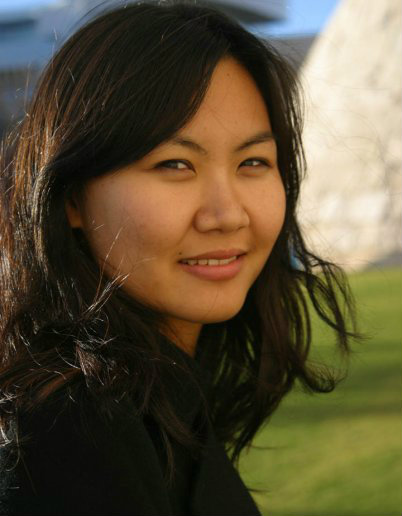Spotlight
Gặp gỡ Cary, Người dẫn chương trình thể thao
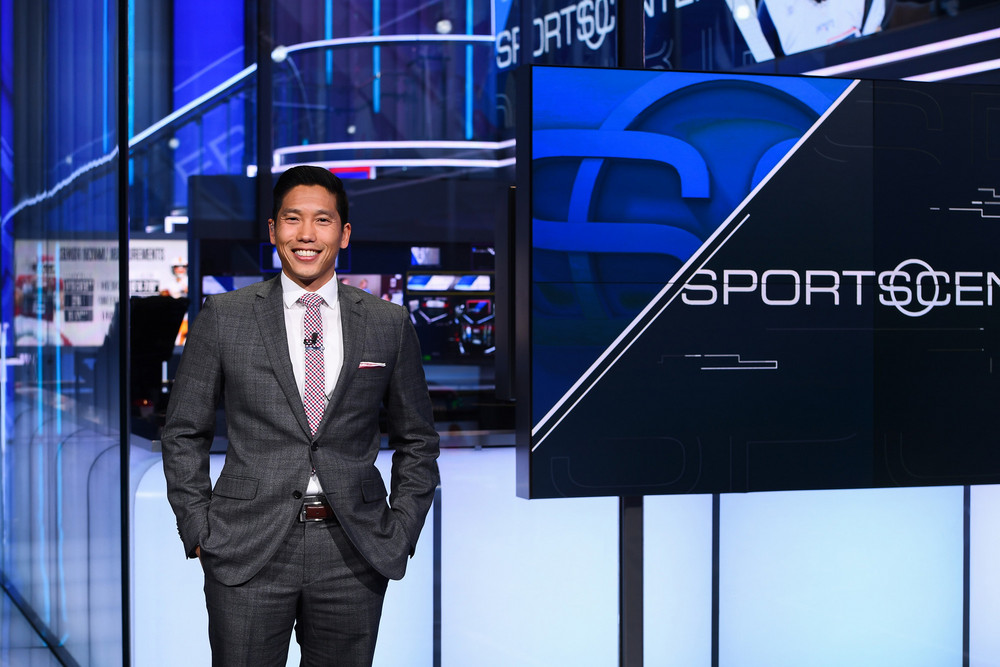 Cary Chow has a flair for traveling, accidentally breaking electronic devices, and anchoring at ESPN. Born and raised in Orange County, CA, Cary is an Edward R. Murrow Award-winning broadcast journalist who’s anchored and reported in California, Wyoming, Alabama, and Connecticut. His career began with a cable access show he and his best friend started, and in the 15 years since, he’s interviewed countless celebrities and covered everything from presidential elections to Super Bowls to the Academy Awards.
Cary Chow has a flair for traveling, accidentally breaking electronic devices, and anchoring at ESPN. Born and raised in Orange County, CA, Cary is an Edward R. Murrow Award-winning broadcast journalist who’s anchored and reported in California, Wyoming, Alabama, and Connecticut. His career began with a cable access show he and his best friend started, and in the 15 years since, he’s interviewed countless celebrities and covered everything from presidential elections to Super Bowls to the Academy Awards.
What influenced you to become a sports anchor?
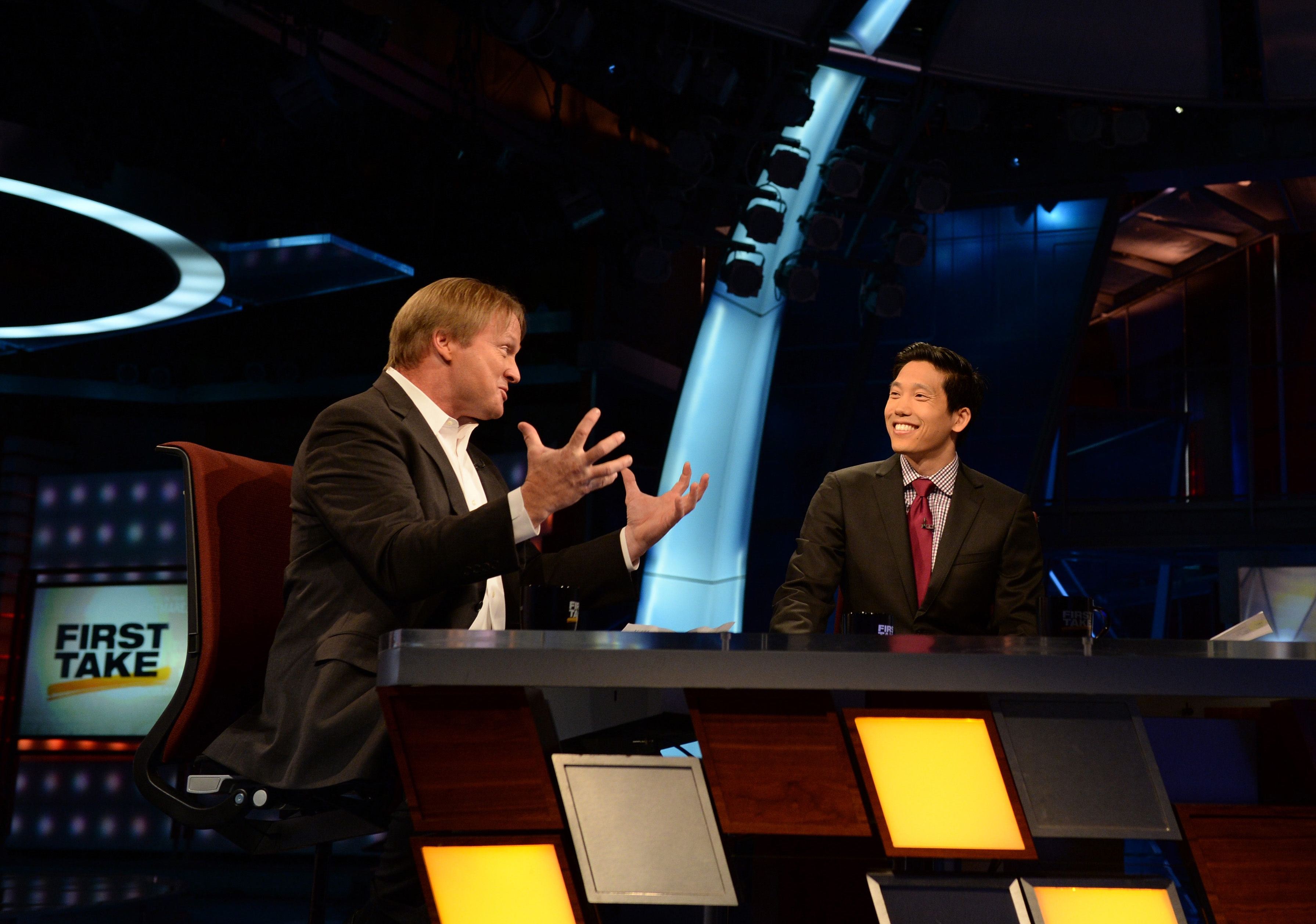 I’ve always been infatuated with both sports and media. Sports played a major role in my father’s American experience, helping him assimilate into this country when he first emigrated here in the 60s. I was infatuated with all sports growing up, watching, playing, you name it. My Asian realist parents made it clear I would never be able to play sports professionally, so I figured the next best thing would be to report about them.
I’ve always been infatuated with both sports and media. Sports played a major role in my father’s American experience, helping him assimilate into this country when he first emigrated here in the 60s. I was infatuated with all sports growing up, watching, playing, you name it. My Asian realist parents made it clear I would never be able to play sports professionally, so I figured the next best thing would be to report about them.
Một ngày bình thường của bạn diễn ra như thế nào?
My days vary depending on my role for the day. If I’m hosting SportsCenter, I first attend an assignment meeting where the show staff discusses the major sports news of the day and decide what elements should make our show. From there, I write scripts for the entire show and depending on staffing, develop questions for show guests I’m interviewing. People are often surprised to hear that anchors write the majority of the shows. Show producers also contribute to scripts when possible, but they’re also busy structuring the entire show and checking for breaking news. While we’re writing out the show, production assistants provide us with highlight shot sheets. Those are what we use to read all the highlights you see on TV. This whole time, we’re usually watching games and scouring the web for any breaking sports news. Around 45-minutes to show, I’ll suit up and get make-up, then head to the set about 10-minutes before the show starts. Once the show starts, my co-anchor, producer, director and I are all communicating about what’s happening on the show, what’s next, and the latest news and scores. We also work with a researcher who provides us with additional nuggets to try to give audiences next level stats and info. Communication is pivotal because the shows are incredibly fluid once games are ending, breaking news happens, or we’re in the process of adding new guests to the show. Typical shows run from 1-3 hours of live TV. Afterwards, we often have a post-show meeting to discuss what went right and wrong.
Hãy kể cho chúng tôi về câu chuyện sự nghiệp của bạn. Nó bắt đầu khi bạn còn trẻ? Sau khi tốt nghiệp đại học? Làm thế nào bạn có được bước chân đầu tiên vào ngành này? Bạn có bất kỳ mối quan hệ nào khi bắt đầu trong ngành này không?
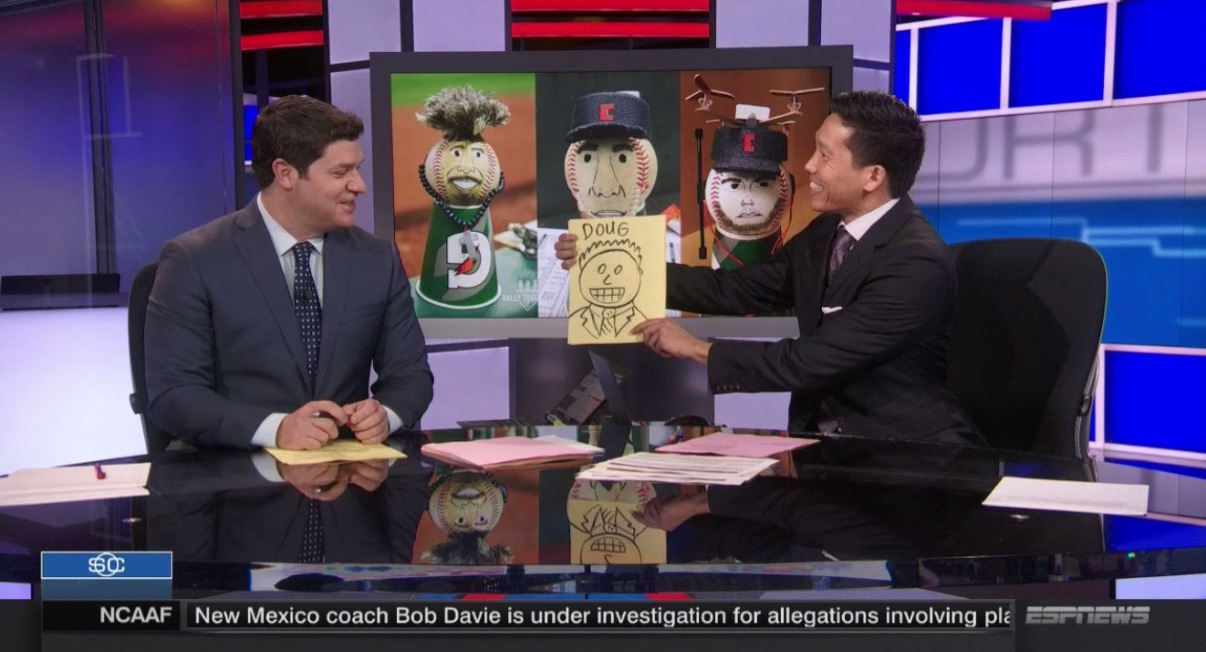 My path to being a sports anchor was anything but planned. I had a part time job writing movie reviews and features at a local paper when I was attending UC-Santa Barbara. I hoped to be a sports news reporter after graduation, but no one was interested. I moved back home and started applying for any and every job. I still had some friends in college and they said they knew of some internships I could apply for, but that meant I had to be a student. I went to a local community college, Fullerton College, and signed up for a class and get a student ID. This enabled me to apply for those internships, but I never attended a single class. I ended up getting two internships, one with KABC-TV in Glendale and another at The Best Damn Sports Show Period with Fox Sports. Didn’t know anyone at either place. Had no connections whatsoever.
My path to being a sports anchor was anything but planned. I had a part time job writing movie reviews and features at a local paper when I was attending UC-Santa Barbara. I hoped to be a sports news reporter after graduation, but no one was interested. I moved back home and started applying for any and every job. I still had some friends in college and they said they knew of some internships I could apply for, but that meant I had to be a student. I went to a local community college, Fullerton College, and signed up for a class and get a student ID. This enabled me to apply for those internships, but I never attended a single class. I ended up getting two internships, one with KABC-TV in Glendale and another at The Best Damn Sports Show Period with Fox Sports. Didn’t know anyone at either place. Had no connections whatsoever.
Neither of the internships were paid, so I worked at Costco to foot bills. Three days a week, I’d work the Fox Sports internship from 9a-5p, then drive straight to KABC-TV and work there until just after 11:30p. Then I’d work at Costco on Friday, Saturday, and Sunday. It was a wild hustle that involved unbearable Southern California traffic. I even started listening to opera to calm me down in the car! While I worked both internships, I always introduced myself to as many people as possible and asked what kind of entry level jobs were available.
After several months, I was able to quit both internships to work 40-plus hours a week as a production assistant at KABC-TV for $8.50/hr. From there, I continued to network, shadow various position, and work on a demo reel, which showcases your work on camera and is essential to being an on-camera talent. I was able to create a reel by going out with photographers on my off-hours, offering to buy them lunch, carrying their equipment, doing whatever grunt work they needed in exchange for them shooting a few clips of me with a mic in front of the camera. I would pack multiple outfits each time so it didn’t look like I was shooting everything on the same day.
At this same time, my best friend, who had his own career aspirations, was working at a local Time Warner Cable station and mentioned if we created a show, it would probably make it on air. So, we created a cable access show from scratch, Fresh TV, so that we could both fine tune our skill set. I was trying to improve my hosting, writing, and producing abilities; he his directing, photography, and editing skills. Combining the clips from KABC-TV and Fresh TV, I sent my VHS tape to hundreds of local TV jobs around the country, and finally the NBC affiliate in Casper, WY, called to offer me a reporter/anchor job. I left Southern California and everyone I knew to pursue this broadcast journalism career. Eight years later, after several twists and turns that took me to Alabama, San Diego, and back to my mom’s house unemployed, I ended up at ESPN with my dream job.
Bạn yêu thích điều gì nhất trong công việc của mình?
One of the most rewarding parts of the job is being able to show fellow minorities, particularly Asian-Americans, that being a sports anchor is a job you can attain. Growing up in a traditional Asian household, my parents did not encourage pursuing a field in TV because they didn’t think it was possible. Asian men in media were few and far between. It gives me tremendous pride when someone tells me I’ve helped inspire them to pursue the same field. Representation matters. On a selfish side note, this job has also enabled me to interview and meet some of my childhood idols, including my favorite baseball player, Ken Griffey Jr, and favorite football player, Barry Sanders. Just waiting to meet Michael Jordan to complete the trifecta!
Thách thức lớn nhất của nó là gì?
You have to be able to think and react quickly, cleverly, and accurately, all while being live on-air where everyone can see or hear your mistakes. Even though we’re talking about sports, you still have to do your homework and be knowledgeable in a vast array of topics, or at least be able to give off that impression. More likely than not, you’ll have to deal with the repercussions of any mistakes on social media or in a public forum. Also, get used to working odd hours. The majority of sporting events come on evenings and weekends, which comes at the cost of spending time with family and friends. The job is a tremendous thrill, never boring, and almost always fun, but that doesn’t mean it can’t be stressful.
Một số sở thích và sở thích của bạn ngoài công việc là gì?

I love playing sports, traveling, and videography. Check out my work on Instagram.com/tcarychow and youtube.com/tcarychow. I also write: tcarychow.blogspot.com.
Bạn có lời khuyên nào không?
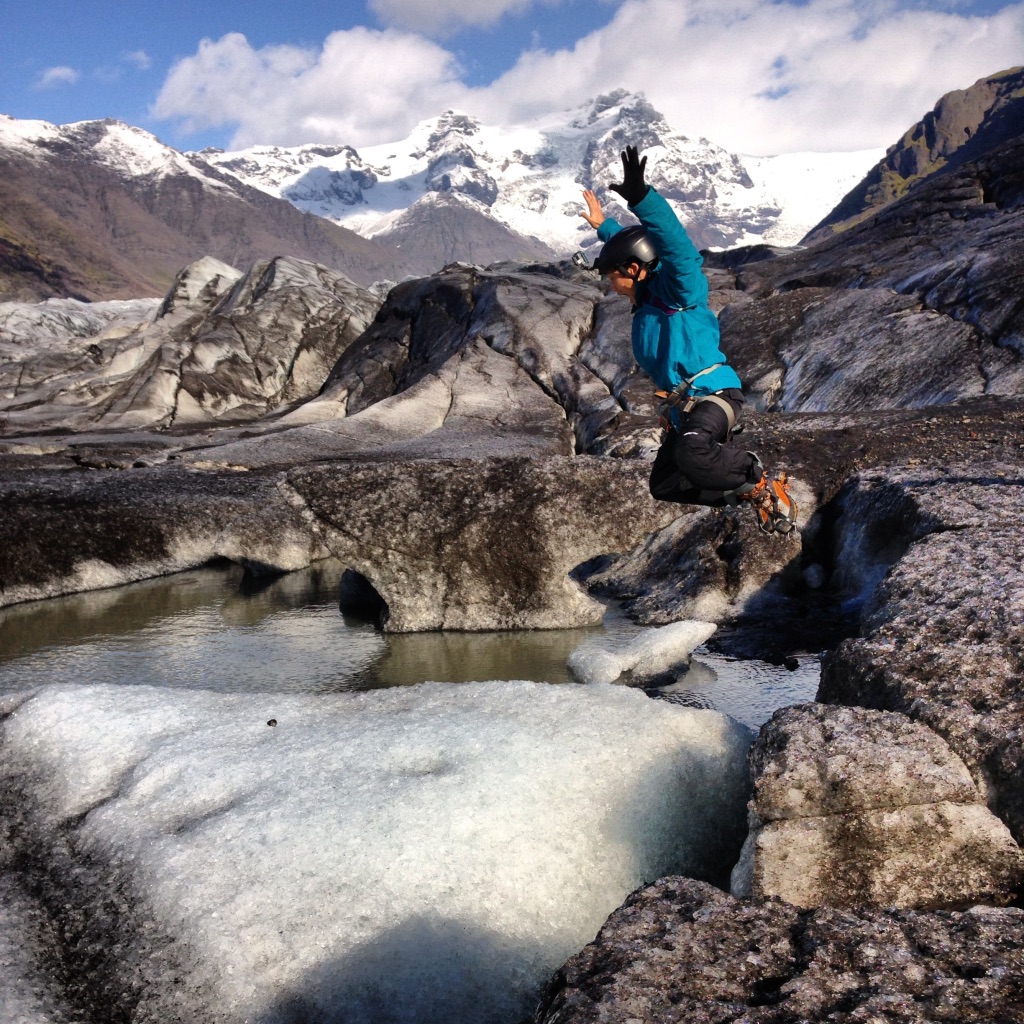 Be prepared to make sacrifices like moving away from friends and family, having bad schedules, making practically no money. Take advantage of journalism organizations and network like crazy. In this business, everyone knows everyone, so be nice to all because you never know who might be able to help you down the line. And it’s just a good rule of thumb to treat others well!
Be prepared to make sacrifices like moving away from friends and family, having bad schedules, making practically no money. Take advantage of journalism organizations and network like crazy. In this business, everyone knows everyone, so be nice to all because you never know who might be able to help you down the line. And it’s just a good rule of thumb to treat others well!




